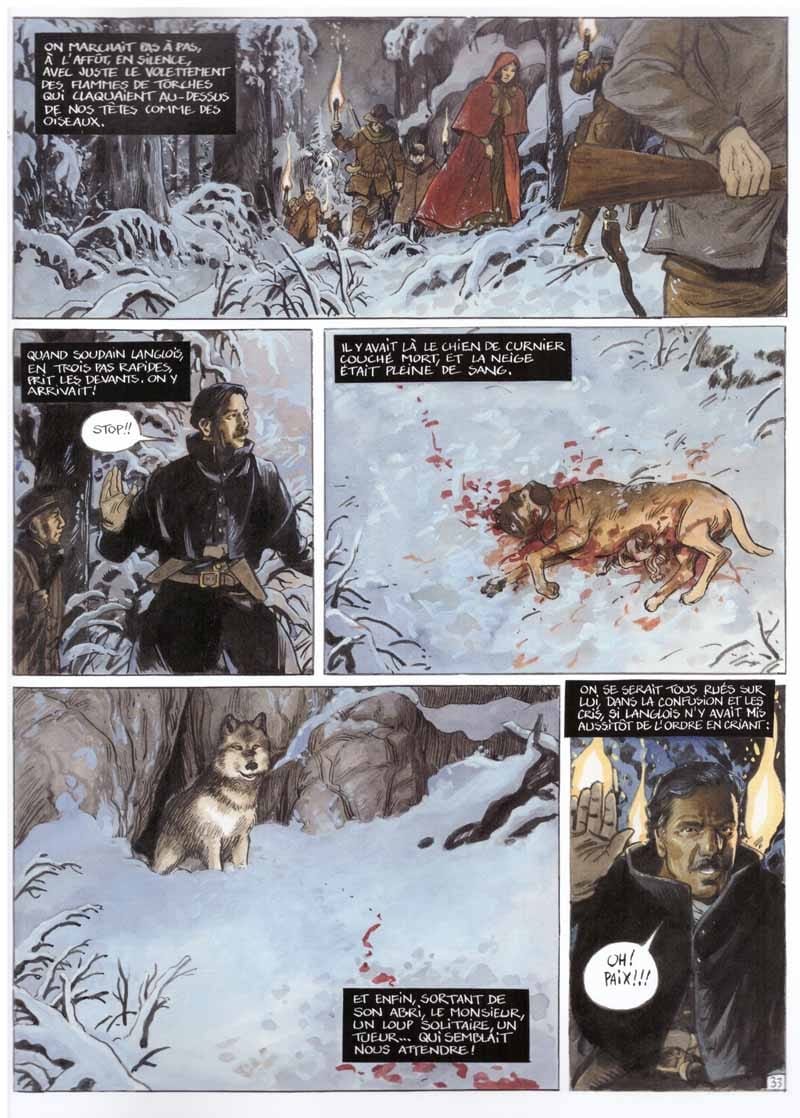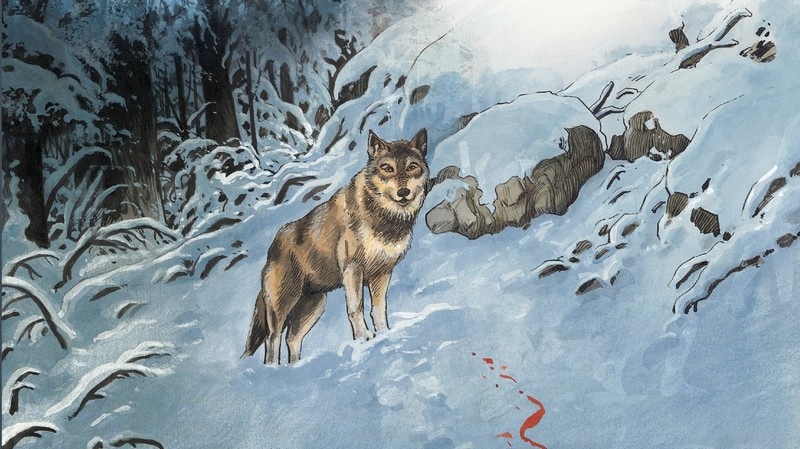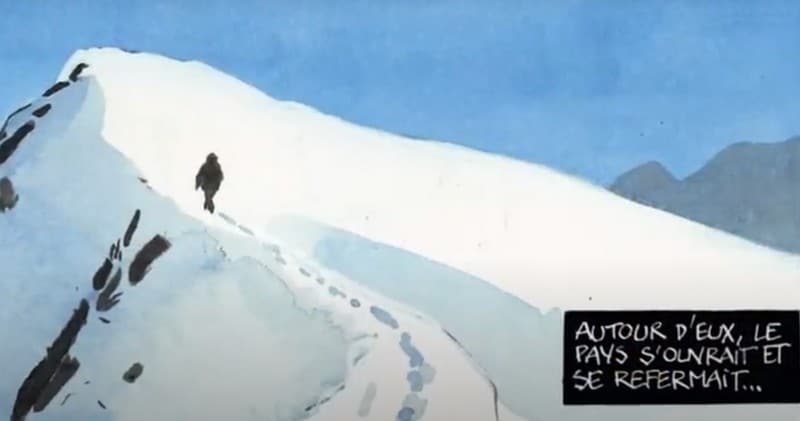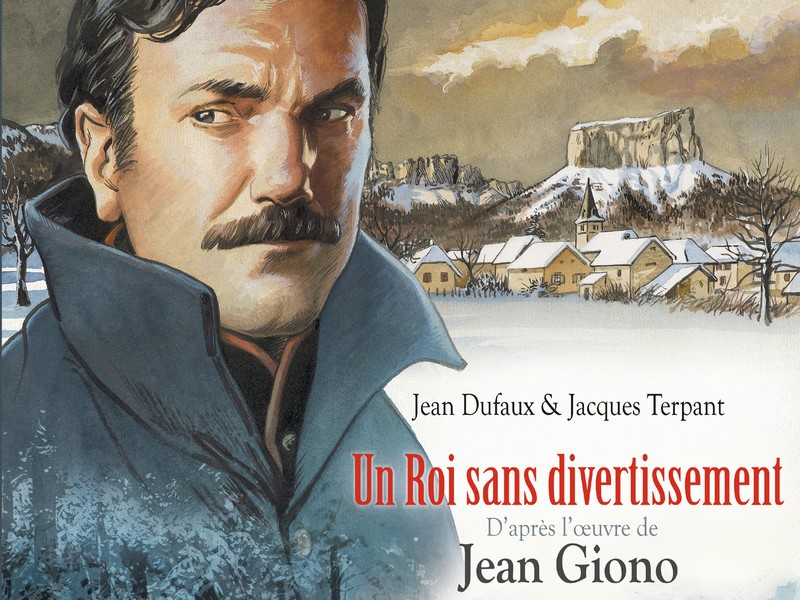After The Dog of God, biography of the writer Céline, and Leather nose, famous novel by Jean de La Varende, Jean Dufaux and Jacques Terpant adapt a masterpiece by Giono.
1843, in the middle of winter. The enigmatic captain of the Langlois gendarmerie, taciturn and secret, goes to Lalley, a small isolated village of Vercors (Isère), in the Alpine massifs. Its mission is to elucidate disturbing disappearances, without leaving any traces, as if a mysterious killer was raging there. Langlois identifies the murderer and shoots him coldly, without trial. A year passes. After having resigned from the gendarmerie, Langlois returns to the valley. His silence intrigued the villagers. He became “commander of the louveterie”, thus responsible for eliminating dangerous wolves. The wolf hunt he organizes is reminiscent of his previous hunt. He eliminates the wolf with two pistol shots, as with the murderer. Then he moved to the village and got married. But despite all his attempts to be entertained, he does not find inner peace. No doubt frightened by his fascination at the sight of a goose’s blood spilled on the snow, he committed suicide by smoking a stick of dynamite …

Jean Dufaux, prolific screenwriter (Giacomo C.., Moray…) And Jacques Terpant pay homage to Jean Giono. They had previously adapted into comics Leather nose (2017) by La Varende and produced The Dog of God (2019), biography of Céline.
Very skillfully, Jean Dufaux does not take up the narrative scheme of the novel A King without Entertainment, characterized by the multiplicity of narrators. This process restored oral tradition and diversified points of view on the mysterious Langlois. Jean Dufaux unites the different narrators in a single character, Giono himself, no doubt for the sake of simplicity. But this comic will be even more appreciated by those who have read the novel.
The title of the novel is inspired by the words of the moralist philosopher Blaise Pascal (1623-1662): “A king without entertainment is a man full of misery”. For Pascal, entertainment is what, in the absence of faith in God, makes life bearable, to forget our mortal condition. But the pagan Giono draws a desperate vision from it. The lack of a reason to live is unbearable. Giono wants to show that man, in order to get out of his existential boredom through entertainment, can go so far as to be fascinated by Evil. In the white silence of the mountain winter, this boredom can even lead to murder or suicide.
For Jacques Terpant, adapting A King Without Entertainment is a new adventure. Fascinated by nature and its beauties, Giono has in this novel described the places that were dear to him. As usual, Jacques Terpant’s designs are sumptuous. Refinement and elegance sum up its style. Known for his adaptations of novels by Jean Raspail (Seven Horsemen, Les Royaumes de Borée), he continued on this path with a more personal series, Capitaine Perdu, with a Pikkendorf as his hero, as in the work of the novelist. Subsequently, he devoted a comic strip to Louis-Ferdinand Céline, entitled Le chien de Dieu. To adapt Nez-de-Cuir, a novel by Jean de La Varende, Terpant once again changes style in order to better respect the atmosphere of the novel.

In this adaptation of Giono, Terpant once again shows his great talent. With a precise line, he draws the magnificent landscapes of this region of Trièves. Its direct color magnifies the immaculate scenery of the snow-capped mountains. It reproduces the monuments and architecture of authentic Lalley houses. He thus manages to illustrate the rich descriptions dear to Giono. The characters are neat, Jacques Terpant having fun endowing the assassin with his own features! He even succeeds in recreating the tragic atmosphere so particular to this story.

To understand this atmosphere, we must recall the career of Jean Giono (1895-1970). Most of his works are set in the peasant world of Provence. The paganism of Giono, passionate about ancient Greece, appears from his first novels, written at the end of the 1920s. There he reveals his vision of the condition of man engaged in moral and metaphysical questions.
But at the end of August 1944, Giono was arrested at the request of the Communist Raymond Aubrac, Commissioner of the Republic in the South-East, who criticized him for his proximity to collaboration. Certainly, Giono published Two storm riders in La Gerbe. But Giono, already arrested in September 1939, this time because of his pacifism, hid during the war refractories and Jews. Giono was the victim of hostility from the Communists. More than the supposed convergences between his poetic celebration of nature and the Petainist ideology of the return to the earth, they do not forgive him for having distanced himself from them and for having denounced Stalinism.
It is thus a morally wounded Giono who writes A king without entertainment. The work, written in the fall of 1946, was not published until 1947, because of the National Committee of Writers, which emerged from the Resistance.
Some of his novels have become great classics of French literature (Regain, The Hussar on the Roof, A king without entertainment, Strong Souls…).
Kristol Séhec
A king without entertainment, 64 p., 17 euros, Editions Futuropolis.
Illustrations : DR
[cc] Breizh-info.com, 2021, dispatches free to copy and distribute subject to mention and link to the original source
–


